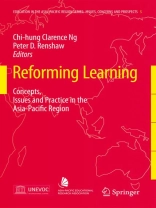In the wake of the 1997 Asian financial crisis, various reform initiatives, policies and programmes have been carried out in different countries within the Asia-Pacific region. All these reform efforts aim to restructure different aspects of schooling in order to promote learning and to prepare students for future challenges in globalised economies. These measures to a certain extent challenge traditional practices, established arrangements and deep-seated assumptions related to different aspects of learning. The authors in this book discuss educational reforms in different countries in the Asia-Pacific region in light of student learning, clarify their concepts, evaluate implementation and impact on the learning processes, with a hope that we can learn better from each other and develop a better understanding of 'contemporary’ learning and teaching processes within the region. The central argument running through different chapters in this book highlights the importance of understanding reforms and learning within their historical, political and sociocultural contexts.
Reforming learning involves changes in established cultural practices in our schools, classrooms, and other learning sites, and therefore inevitably arouses tensions and negotiations. The discussion in this book puts to the fore the disputable nature of reforming learning and the significance of contextualising the complex relationship between reforms and learning.
Spis treści
Reforming Learning in the Asia-Pacific Region: An Introduction.- Exploring the Linkage Between Reforms and Learning in the Asia-Pacific Region: An Activity Theory Perspective.- Focusing on Tools, Transformation and New Learning.- Reforming Mathematics Education: Theorising Teachers’ and Students’ Use of Technology.- Reforming Learning and Teaching Through Online Collaborative Knowledge Building.- Technological Barriers to Learning: Designing Hybrid Pedagogy To Minimise Cognitive Load and Maximise Understanding.- An Examination of Project Work: A Reflection on Singapore’s Education Reform.- Creating and Interpreting Multimodal Representations of Knowledge: Case Studies from Two Singapore Science Classrooms.- Reforming Teaching and Learning Using Theory of Multiple Intelligences: The Macao Experiences.- Makabayan in the Philippine Basic Education Curriculum: Problems and Prospect for Reforming Student Learning in the Philippines.- Reforming Medium of Instruction in Hong Kong: Its Impact on Learning.- Focusing on Contradictions, Tensions and Systemic Change.- Problems and the Direction of Reform for Education in Japan Today.- ‘Learning for Achievement’ as a Collective Goal in Re-culturing Teaching and Learning in Hong Kong Classrooms.- Motivational Implications of the Quality Teaching Model in New South Wales.- Reforming Learning for Children with Learning Differences in New Zealand.- Technology-Supported Pedagogical Innovations: The Challenge of Sustainability and Transferability in the Information Age.- Successful Approaches to Innovation that Have Impacted on Student Learning in New Zealand.












